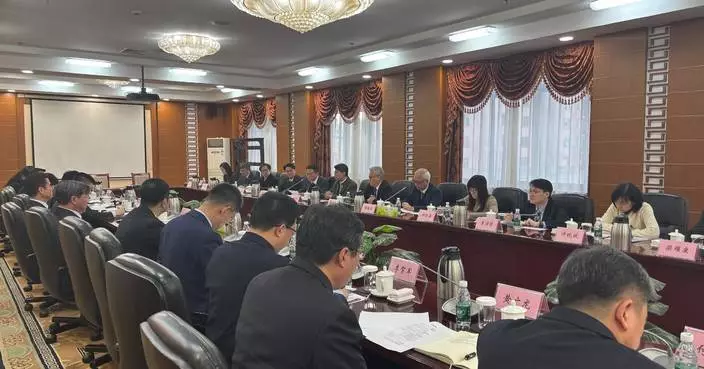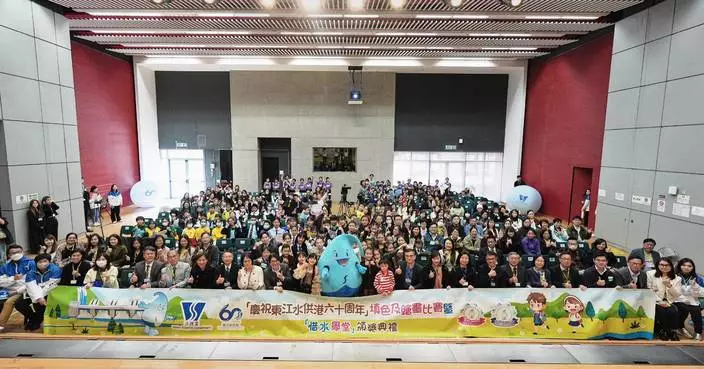Partnership Fund for the Disadvantaged and its Dedicated Portion for implementing After-school Learning and Support Programmes open for new round of applications
The Partnership Fund for the Disadvantaged (PFD), managed by the Social Welfare Department (SWD), is inviting the 18th round of Regular Portion applications and the 11th round of Dedicated Portion applications for implementing After-school Learning and Support Programmes starting from today (December 19). Welfare non-governmental organisations (NGOs) and eligible primary and secondary schools can submit proposals from today to October 31, 2025. The PFD Secretariat will process and grant approval to the applications in two periods in accordance with the chronological order that the applications are received.
The Government set up the PFD in 2005 to promote a tripartite partnership among the welfare sector, business corporations and the Government for helping the disadvantaged. The Government provides matching grants with regard to the donations made by business partners to support welfare NGOs in running social welfare projects. Up till now, the Government has injected a total of $1.2 billion into the PFD, including around $800 million for the Regular Portion to help the disadvantaged and around $400 million for the Dedicated Portion. Since its launch in 2015, the Dedicated Portion has been actively promoting the "Government-Welfare Sector-Business-School" collaboration to implement more after-school learning and support programmes for primary and secondary students from grassroots families to enable their whole-person development.
A spokesman for the SWD said that in the earlier 17 rounds of Regular Portion applications of the PFD, matching grants totalling over $600 million were approved for 233 welfare NGOs to implement a total of 1 209 welfare projects sponsored by over 1 900 business organisations, benefiting around 1 025 000 disadvantaged persons. The first 10 rounds of Dedicated Portion applications attracted a favourable response. Over $346 million in matching grants have been approved for 568 after-school learning and support projects. Over 490 business organisations have participated in the projects, benefiting around 138000 primary and secondary students.
For the new round of applications, the ceiling of grants for each Regular Portion project is $3million, and that for each Dedicated Portion project is $4.5 million. Applications for the Regular Portion and the Dedicated Portion are open today. Details are as follows –
18th Round Regular Portion applications |
11th Round Dedicated Portion applications |
Eligible applicants |
Bona-fide charitable welfare NGOs having tax-exempt status under section 88 of the Inland Revenue Ordinance (Cap. 112) |
Bona-fide charitable welfare NGOs having tax-exempt status under section 88 of the Inland Revenue Ordinance (Cap. 112)
Public sector primary and secondary schools including government schools, aided schools and caput schools, and schools under the Direct Subsidy Scheme
Contents of the projects |
Social welfare projects for the disadvantaged |
After-school learning and support programmes for primary and secondary students from grassroots families |
Application guides and forms |
SWD homepage:
www.swd.gov.hk/en/svcdesk/funds/
partnership/ |
SWD homepage:
www.swd.gov.hk/en/svcdesk/funds/
dedicatedportion/ |
Application periods (Note) |
Period 1: December 19, 2024, to May 30, 2025
Period 2: December 19, 2024, to October 31, 2025 |
Period 1: December 19, 2024, to April 30, 2025
Period 2: December 19, 2024, to October 31, 2025 |
Note: Applicants can submit proposals at any time from today till the end of the first and the second application periods. The PFD Secretariat will process and grant approval to the applications in accordance with the chronological order that the applications are received.
Details of the Regular Portion and the Dedicated Portion of the PFD are available on the SWD homepage: www.swd.gov.hk. For enquiries about the applications, please contact the Secretariat of the PFD during office hours on 3468 2710 or 3468 2718, or by email to pfdenq@swd.gov.hk.
Waste statistics for 2023 published
The Environmental Protection Department (EPD) today (December 19) published the report "Monitoring of Solid Waste in Hong Kong - Waste Statistics for 2023". It presents the 2023 statistics on disposal and recovery/recycling of solid waste generated in Hong Kong, including municipal solid waste (MSW) (covering both domestic waste and commercial and industrial waste), overall construction waste and special waste.
The total quantity of MSW disposed of at landfills has dropped for two consecutive years to 3.97 million tonnes in 2023, and the average daily quantity was 10 884 tonnes, representing a decrease of 2.2 per cent from the average of 11 128 tonnes in 2022. Among these, disposal of waste plastics has dropped by 10.5 per cent; overall disposal of food waste has dropped by 3.4 per cent, in particular disposal of domestic food waste has dropped by 12.6 per cent; and disposal of waste paper and waste metal has decreased by 3.2 per cent and 9.5 per cent respectively. The per capita MSW disposal rate per day was 1.44 kilograms, down from 1.51 kilograms in 2022 by 4.7 per cent. Among the three major categories of MSW in 2023, food waste accounted for 29 per cent, followed by waste paper and waste plastics, accounting for 20 per cent and 19 per cent respectively, which are lower than the corresponding shares in 2022.
Besides, with the implementation of the Enhanced Plastic Shopping Bag Charging Scheme by the Government since December 31, 2022, the number of plastic shopping bags disposed of in 2023 was 3.72 billion, down from 5.43 billion in 2022 by 31.5 per cent, among which the number of flat-top bags disposed of has dropped by more than 60 per cent.
The overall MSW recovery rate rose for three consecutive years, with the latest figure rising from 32 per cent in 2022 to 33 per cent in 2023 and the increase in total recovery amount was more than 55000 tonnes, among which the quantity of MSW recovered for local recycling was about 450000 tonnes in 2023, representing an increase of 8 per cent compared to about 420000 tonnes in 2022. The increase was mainly driven by the local recycling of plastic recyclables (around 7000 tonnes), food waste (around 7000 tonnes) and ferrous metal recyclables (around 16000 tonnes).
An EPD spokesperson said that in order to achieve the vision of "Waste Reduction‧Resources Circulation‧Zero Landfill" by 2035, the current term Government is working at full steam to promote the culture of waste reduction and recovery, and to encourage active participation in waste reduction by citizens through the community recycling network GREEN@COMMUNITY and the food waste collection network. The latest statistics have shown a clear downward trend in MSW disposal and a continuous upward trend in the recovery rate, reflecting the Government's persistent effort in promoting waste reduction and recovery is gaining momentum.
Regarding construction waste, the Government implemented the Construction Waste Disposal Charging Scheme in order to put the "polluter pays" principle to work and provide economic incentives encouraging the construction industry to reduce construction waste generation at source, as well as direct reuse of generated construction waste through project matching or storing it at public fill reception facilities for reuse in the future. For some small-scale works such as home renovations and shops demolitions, sorting and recovering construction waste on-site can be quite challenging due to limitations at the working sites. In this regard, in recent years, the Government has encouraged small-scale works to properly dispose of construction waste in a compliant and paid manner through publicity and education, strengthened enforcement actions, as well as a pilot scheme to assist with collection of construction waste.
Construction waste statistics in recent years showed the effectiveness of the strategies concerned. The overall quantity of construction waste generation in 2023 dropped by about 4 300 tonnes per day (9 per cent) as compared to 2022, to 45 560 tonnes per day on average, of which more than 90 per cent of construction waste (41 132 tonnes per day) was reused. Regarding the construction waste disposed of at landfills, the quantity increased by 300 tonnes per day (7 per cent) as compared to 2022, reaching 4 428 tonnes per day in 2023. The rise is believed to stem from an increase in both the numbers of companies that ceased operation and started new business in 2023 compared to 2022, thereby generating more construction waste associated with renovation and demolition works.
The EPD also encourages private enterprises to upcycle construction waste into products like eco-blocks, ceramic products and outdoor paving materials. In terms of land, there is an enterprise operating construction waste recycling facilities in the EcoPark. The EPD has also provided land for short-term lease for the purpose of recycling of construction waste. Moreover, the Recycling Fund has also subsidised different enterprises' projects on upcycling of construction waste.
Looking ahead, seizing the opportunity of increasing public participation in waste reduction and recycling, the Government will further promote to establish a green waste reduction and recycling culture in society. Apart from regulating disposable plastic tableware and other plastic products in phases, the Government will launch a host of initiatives. These include: (1) Continue to encourage private residential premises to participate in the Waste Reduction and Recycling Charter, and enhance public awareness and habits of recycling through measures such as optimising the service hours of the recycling facilities under GREEN@COMMUNITY, doubling the number of residential food waste collection facilities in Hong Kong, as well as strengthening the publicity and education on waste reduction and recycling in the community and schools; (2) Introduce a bill into the Legislative Council to establish a common legislative framework of producer responsibility schemes on different products, thereby facilitating the progressive inclusion of such products as plastic beverage containers and beverage cartons in future; (3) With facilitation measures in place, increase the useable area and extend the lease term of short-term tenancy sites designated for recycling operations to provide the recycling trade with more room for upcycling.
In the meantime, the Government is building an advanced and efficient network of modern waste-to-energy facilities at full steam, including the Integrated Waste Management Facilities Phase 1 (I·PARK1) which is under construction near Shek Kwu Chau; and the Integrated Waste Management Facility Phase 2 (I·PARK2) which is available for open tendering by the end of this year. The goal is to achieve zero landfill with the efforts by the Hong Kong Special Administrative Region Government and citizens.
The report and "Hong Kong 2023 Municipal Solid Waste - At a Glance" are both available in electronic format and can be obtained from the EPD website at www.wastereduction.gov.hk/en/assistancewizard/waste_red_sat.htm.







